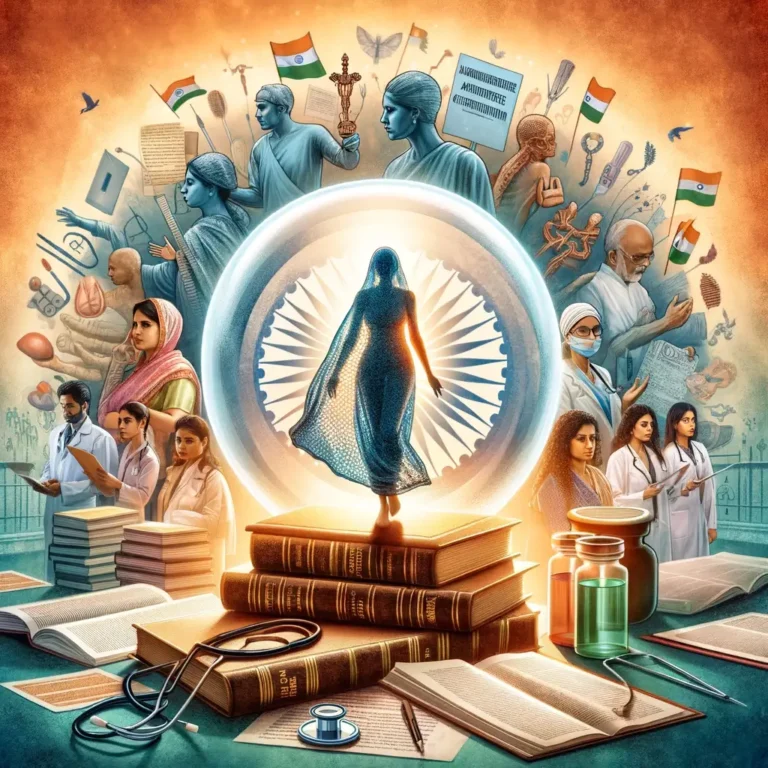In this article we have discussed about Women’s Access To Healthcare Rights In India. In India, ensuring equal healthcare rights for women is crucial for their empowerment and well-being. This article delves into the landscape of women’s access to healthcare in India, highlighting the legal framework, challenges, and initiatives aimed at improving this vital aspect of women’s rights.
Women’s Access to Healthcare Rights in India: A Comprehensive Guide
The Legal Framework
India’s constitution and several laws advocate for women’s rights, including their right to healthcare. The Indian legal system, through various acts and policies, aims to provide a robust foundation for women’s health rights, ensuring access to healthcare services without discrimination.
Key Legislations and Policies
- The Maternity Benefit Act, 1961: This act guarantees maternity benefits for women employed in certain establishments, including maternity leave, medical allowances, and nursing breaks.
- The National Health Mission: It encompasses various programs aimed at improving women’s health, focusing on reproductive, maternal, neonatal, child, and adolescent health.
- The Protection of Women from Domestic Violence Act, 2005: Recognizes the right of women to be protected against domestic violence, including the right to medical facilities.
Challenges in Accessing Healthcare
Despite the legal framework, numerous challenges hinder women’s access to healthcare in India. These include socio-economic barriers, gender discrimination, lack of awareness, and inadequate healthcare infrastructure in rural areas.
Initiatives to Improve Women’s Healthcare Access
Government Initiatives
The Indian government has launched several initiatives aimed at enhancing women’s healthcare access. Programs like Janani Suraksha Yojana (JSY) incentivize institutional deliveries, while Pradhan Mantri Surakshit Matritva Abhiyan (PMSMA) provides free antenatal check-ups for pregnant women.
NGO and Community Efforts
Non-governmental organizations (NGOs) and community groups play a crucial role in bridging the healthcare gap. They conduct awareness campaigns, provide healthcare services in remote areas, and advocate for women’s health rights.
The Way Forward: Empowering Women Through Healthcare
Improving women’s access to healthcare in India requires a multi-faceted approach. Education and awareness are key to empowering women to assert their health rights. Strengthening healthcare infrastructure and ensuring the effective implementation of laws and policies are also critical.
Role of Technology
Leveraging technology can play a pivotal role in enhancing women’s healthcare access. Telemedicine, mobile health apps, and digital awareness campaigns can overcome geographical and socio-economic barriers.
Community Engagement
Active community engagement is essential for addressing cultural and societal norms that hinder women’s access to healthcare. Community health workers can serve as bridges between women and healthcare services, promoting gender-sensitive health practices.
Conclusion: A Collective Effort Towards Equality
The journey towards ensuring women’s access to healthcare rights in India is a collective endeavor. It requires the concerted efforts of the government, NGOs, healthcare providers, and the community. By addressing legal, socio-economic, and cultural barriers, India can move closer to achieving healthcare equity for women, empowering them to lead healthier and more fulfilling lives.
This guide aims to shed light on the importance of healthcare rights for women in India and the ongoing efforts to improve their access to these rights. Through understanding, collaboration, and action, we can make a significant impact on the lives of women across the country, ensuring they receive the healthcare they rightfully deserve.
FAQ on Women’s Access to Healthcare Rights in India
- What are women’s healthcare rights in India?
- Women in India have the right to access healthcare without discrimination, including reproductive, maternal, neonatal, child, and adolescent health services.
- Is maternity leave a legal right in India?
- Yes, under the Maternity Benefit Act, 1961, women are entitled to maternity leave with pay.
- What is the National Health Mission?
- It’s a government initiative aimed at improving health care across India, with a focus on rural areas, and includes specific programs for women’s health.
- Can women in India receive free healthcare?
- Yes, there are several government schemes like Janani Suraksha Yojana (JSY) that provide free healthcare services to women, especially for maternity care.
- What are some challenges women face in accessing healthcare in India?
- Challenges include socio-economic barriers, gender discrimination, lack of awareness, and insufficient healthcare infrastructure.
- How does domestic violence affect women’s healthcare rights?
- Domestic violence can hinder women’s ability to access healthcare services. The Protection of Women from Domestic Violence Act, 2005, addresses this by ensuring victims have access to medical facilities.
- What initiatives exist to improve maternal health in India?
- Initiatives like Pradhan Mantri Surakshit Matritva Abhiyan (PMSMA) offer free antenatal check-ups to pregnant women.
- How do NGOs contribute to women’s healthcare in India?
- NGOs play a crucial role by providing healthcare services, conducting awareness campaigns, and advocating for women’s health rights.
- What is the role of technology in improving women’s healthcare access?
- Technology, through telemedicine and mobile health apps, helps overcome barriers to healthcare access, especially in remote areas.
- Why is community engagement important in women’s healthcare?
- Community engagement helps address cultural and societal norms that restrict women’s access to healthcare, promoting gender-sensitive health practices.
- Are there specific laws for women’s healthcare in India?
- While there are no laws exclusively for women’s healthcare, several laws and policies, like the Maternity Benefit Act, 1961, include provisions that benefit women’s health.
- Can unmarried women access reproductive health services in India?
- Yes, unmarried women also have the right to access reproductive health services, though societal stigma may pose challenges.
- What is the impact of socio-economic status on women’s healthcare access?
- Women from lower socio-economic backgrounds often face greater challenges in accessing healthcare services due to financial constraints and lack of information.
- How does gender discrimination affect women’s healthcare?
- Gender discrimination can lead to women receiving less priority in healthcare access compared to men, impacting their health outcomes.
- What is Janani Suraksha Yojana (JSY)?
- JSY is a government scheme that promotes institutional deliveries among poor pregnant women by providing cash incentives.
- How are mental health services for women addressed in India?
- Mental health services are increasingly being recognized as crucial for women’s health, though access and awareness remain limited.
- What role do community health workers play in women’s healthcare?
- They act as liaisons between women and healthcare services, especially in rural areas, providing information and facilitating access to healthcare.
- Are there any programs for women’s cancer screening in India?
- Yes, programs like the National Programme for Prevention and Control of Cancer, Diabetes, Cardiovascular Diseases & Stroke (NPCDCS) offer cancer screening services for women.
- How does education affect women’s healthcare rights?
- Education plays a significant role in empowering women to understand and assert their healthcare rights, leading to better health outcomes.
- What measures are being taken to address the shortage of female healthcare professionals in rural areas?
- Initiatives include scholarships for female medical students, incentives for serving in rural areas, and support for nurse practitioners and midwives.
- Can women in India legally access abortion services?
- Yes, abortion is legal in India under certain conditions, as governed by the Medical Termination of Pregnancy Act, 1971.
- What is the significance of the Protection of Women from Domestic Violence Act, 2005, in healthcare?
- It recognizes the impact of domestic violence on women’s health and ensures victims have access to medical facilities.
- How does cultural stigma affect women’s healthcare access?
- Cultural stigma, especially around reproductive and sexual health, can deter women from seeking necessary healthcare services.
- What is telemedicine, and how does it benefit women in India?
- Telemedicine involves delivering healthcare services via digital platforms, helping women in remote areas access medical advice and consultations.
- Are there any health insurance schemes specifically for women in India?
- Yes, there are health insurance schemes like Rashtriya Swasthya Bima Yojana (RSBY) that cater to women, especially those from low-income families.
- How can women in India access healthcare information?
- Through government portals, healthcare apps, community health workers, and awareness campaigns conducted by NGOs.
- What is the role of female empowerment in improving healthcare access?
- Empowering women enables them to make informed health choices, seek healthcare proactively, and advocate for their and their family’s health rights.
- How does the government address healthcare needs of women in conflict zones in India?
- Special healthcare services and mobile clinics are deployed in conflict zones to address the healthcare needs of women, ensuring their access to essential health services.
- What challenges do pregnant women face in accessing healthcare in rural India?
- Challenges include distance to healthcare facilities, lack of transportation, inadequate healthcare infrastructure, and shortage of skilled healthcare providers.
- How can men support women’s access to healthcare rights?
- Men can support by promoting gender equality, participating in family health decisions, and advocating for women’s healthcare rights in their communities.
Sources
















